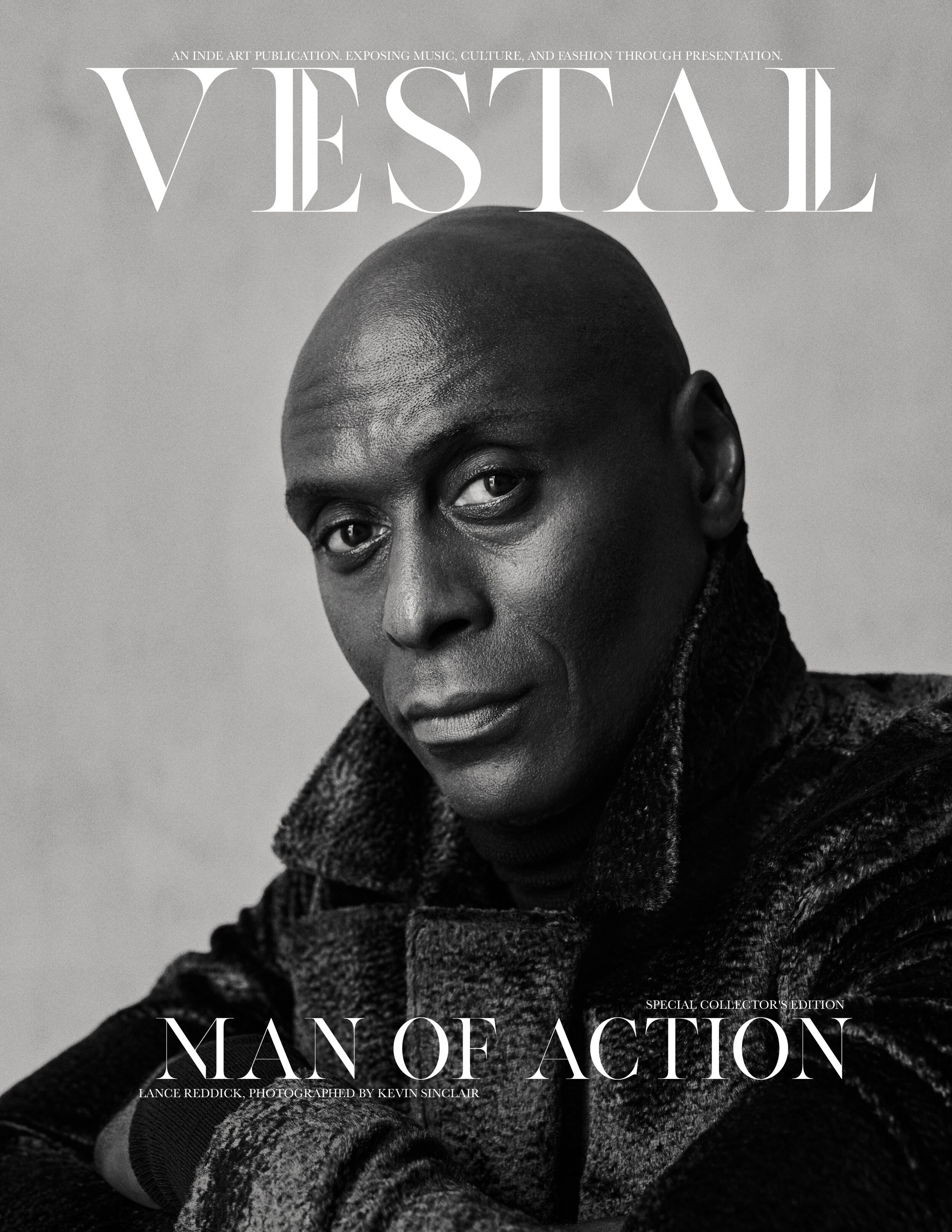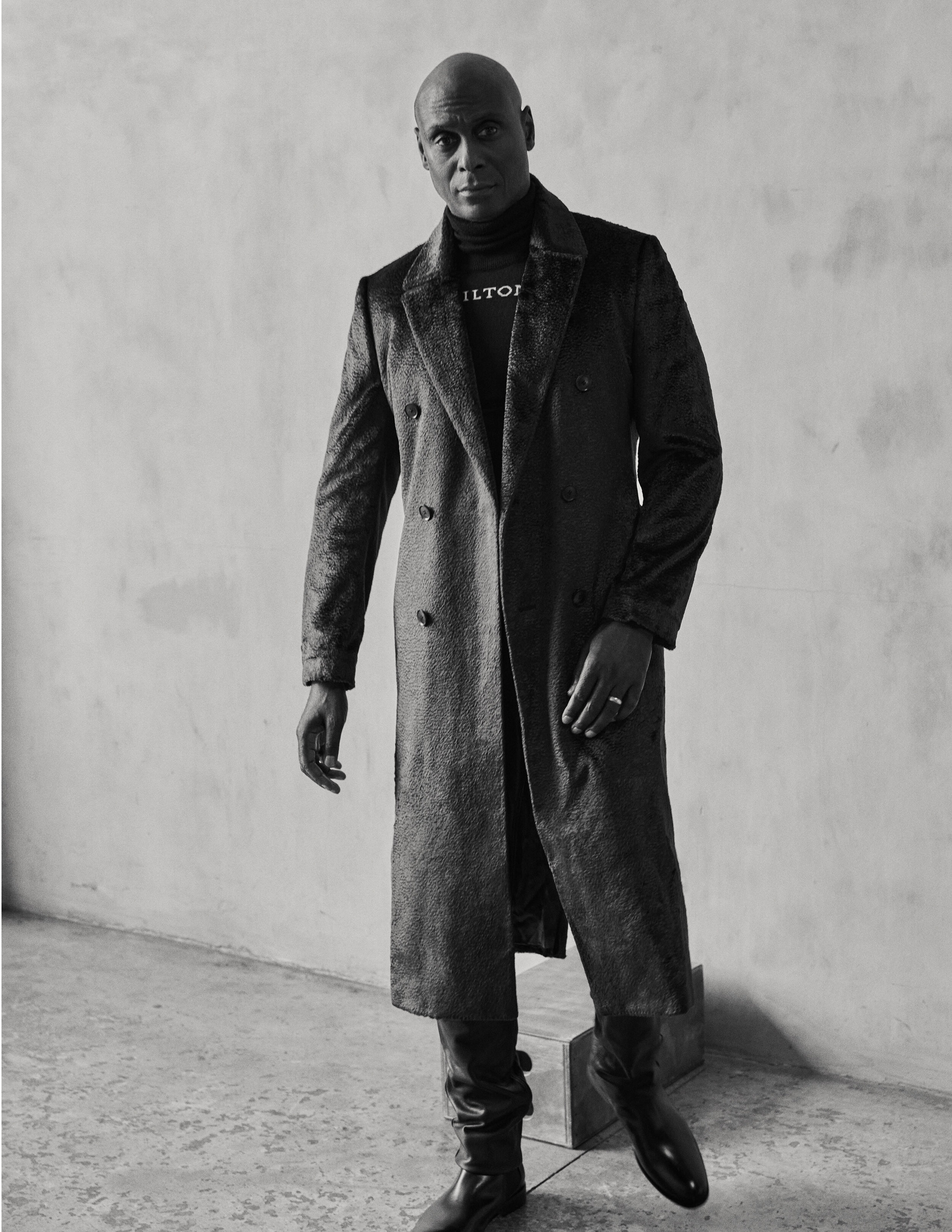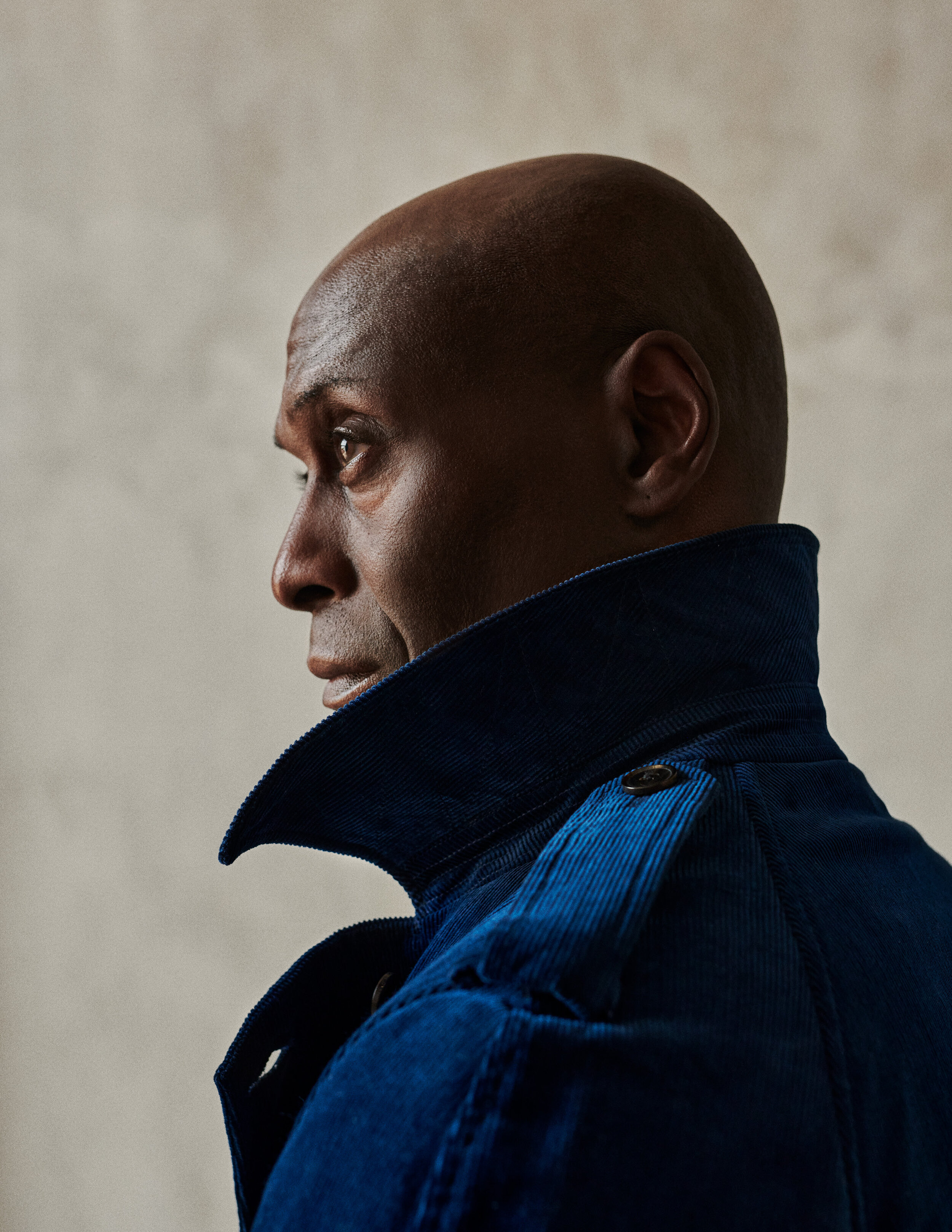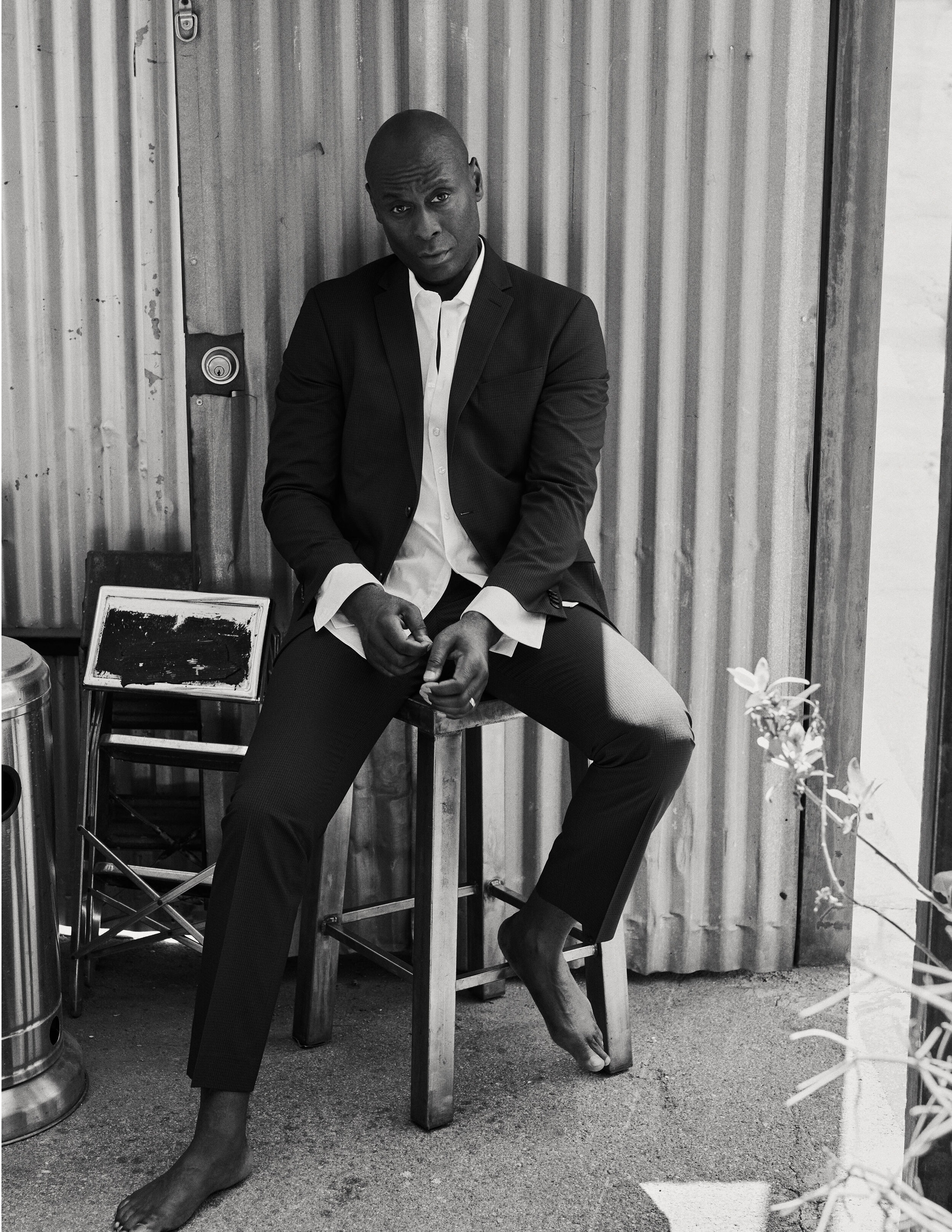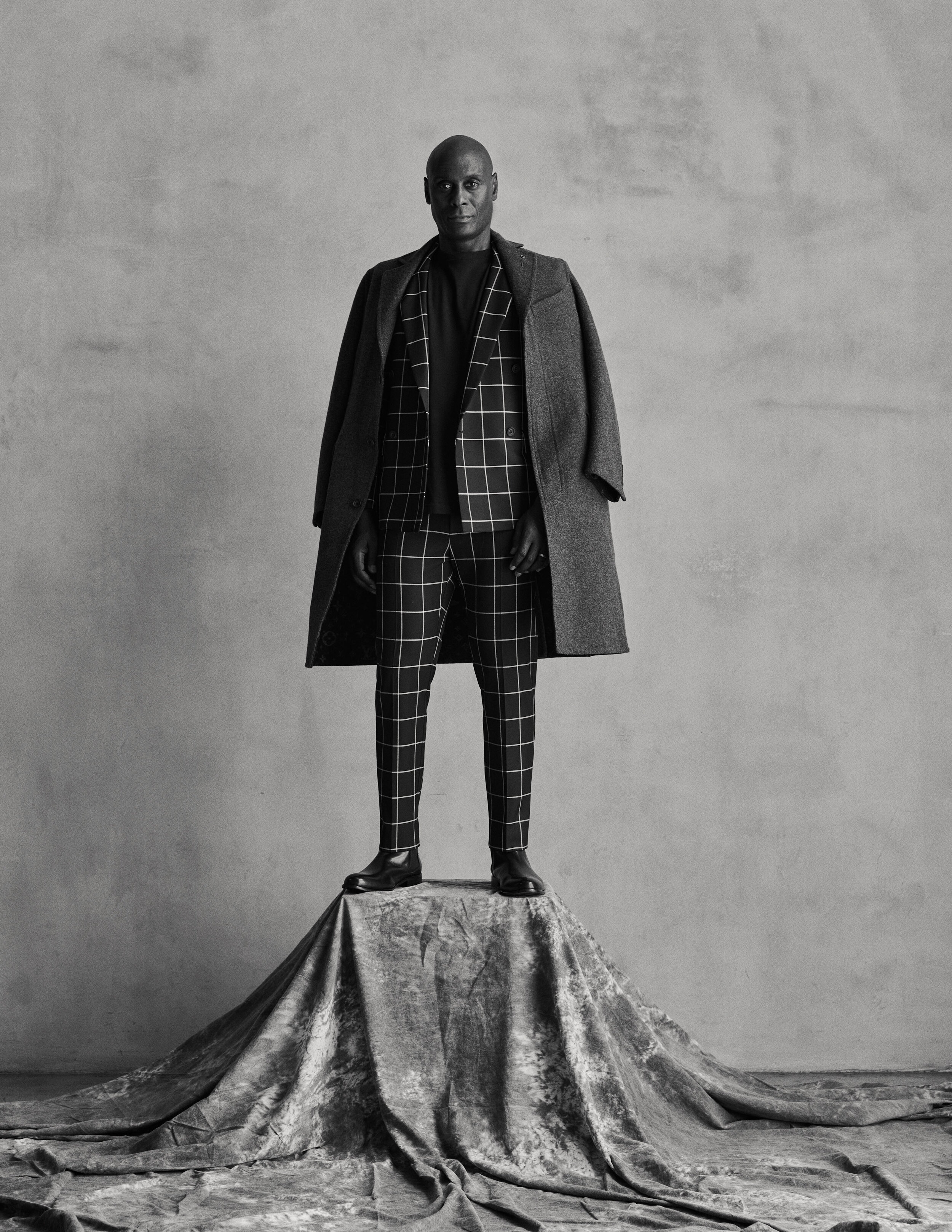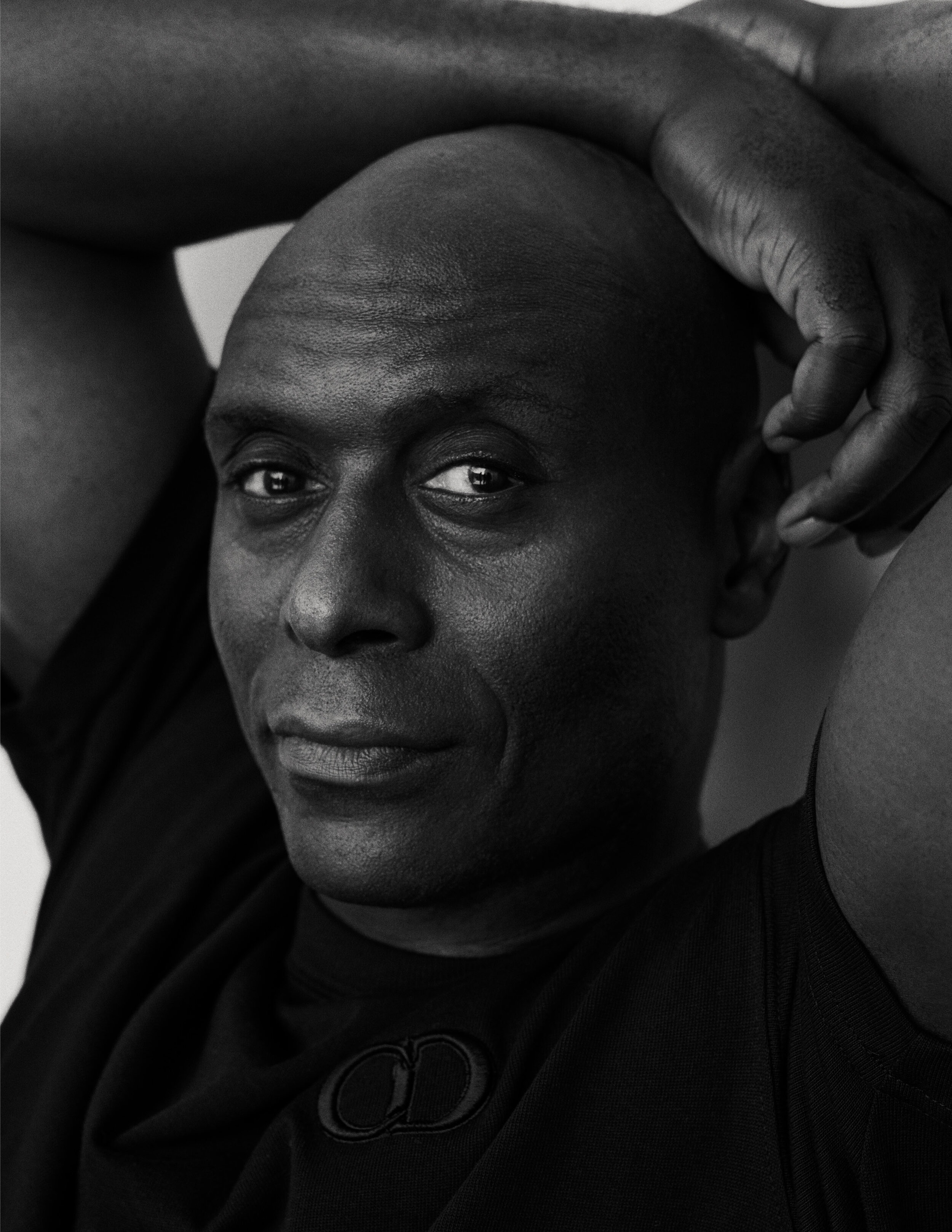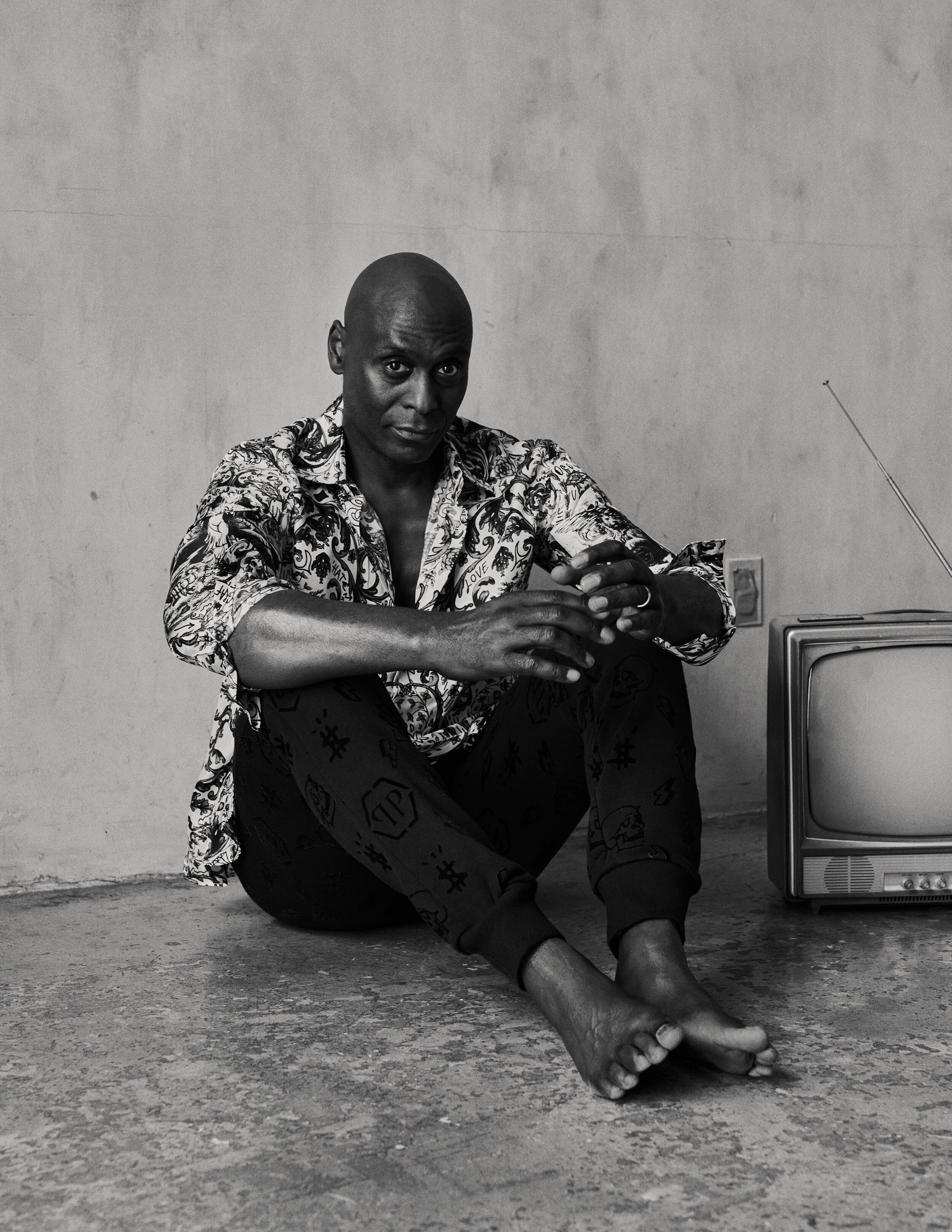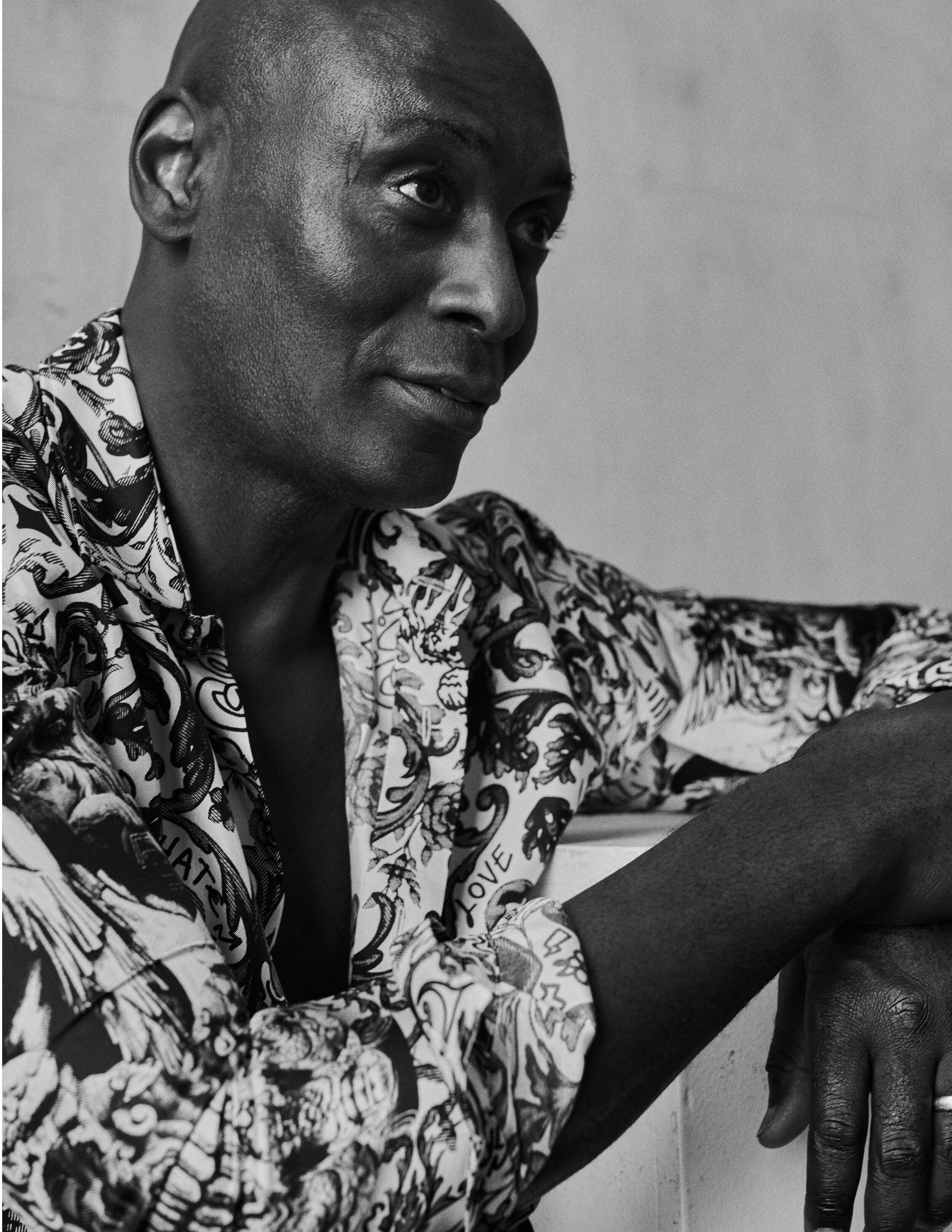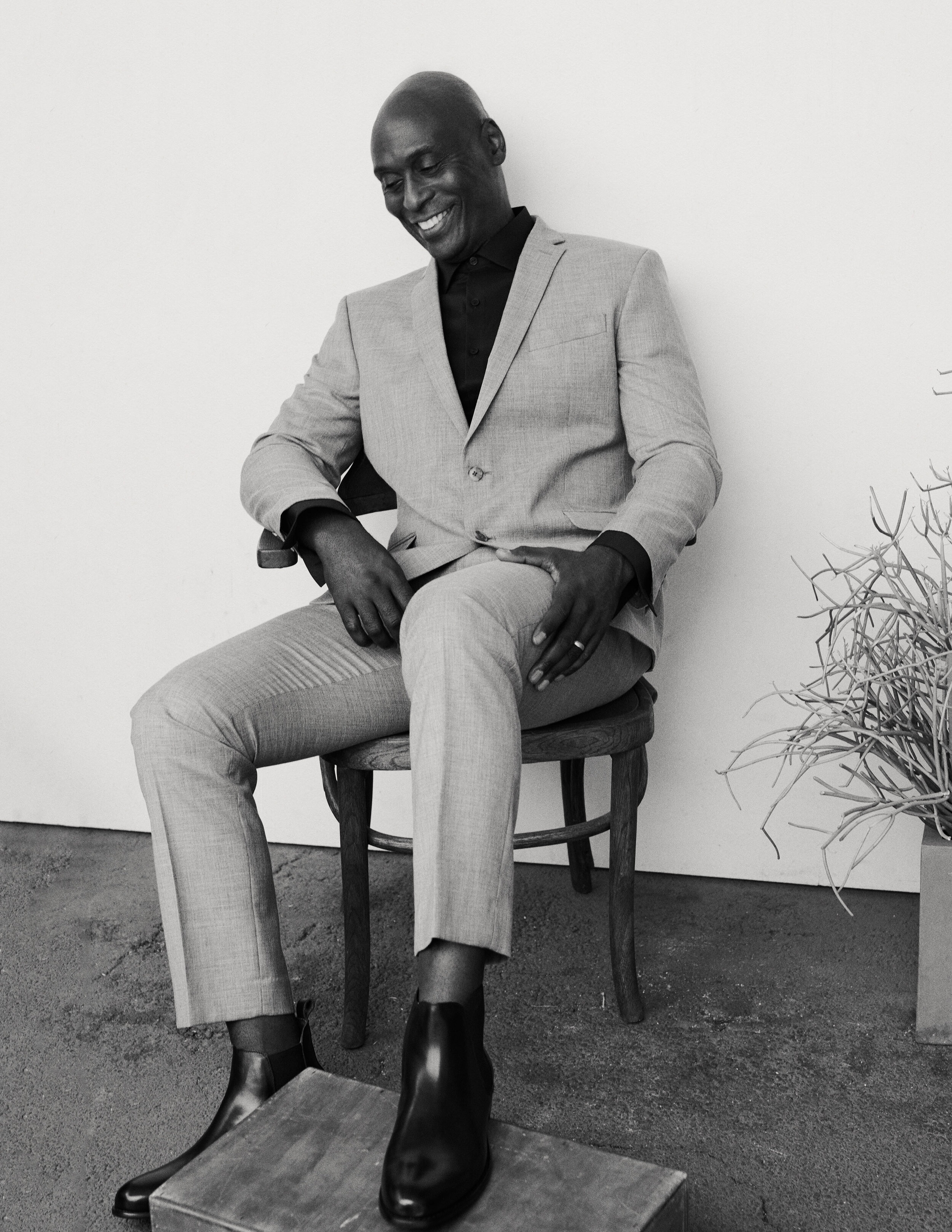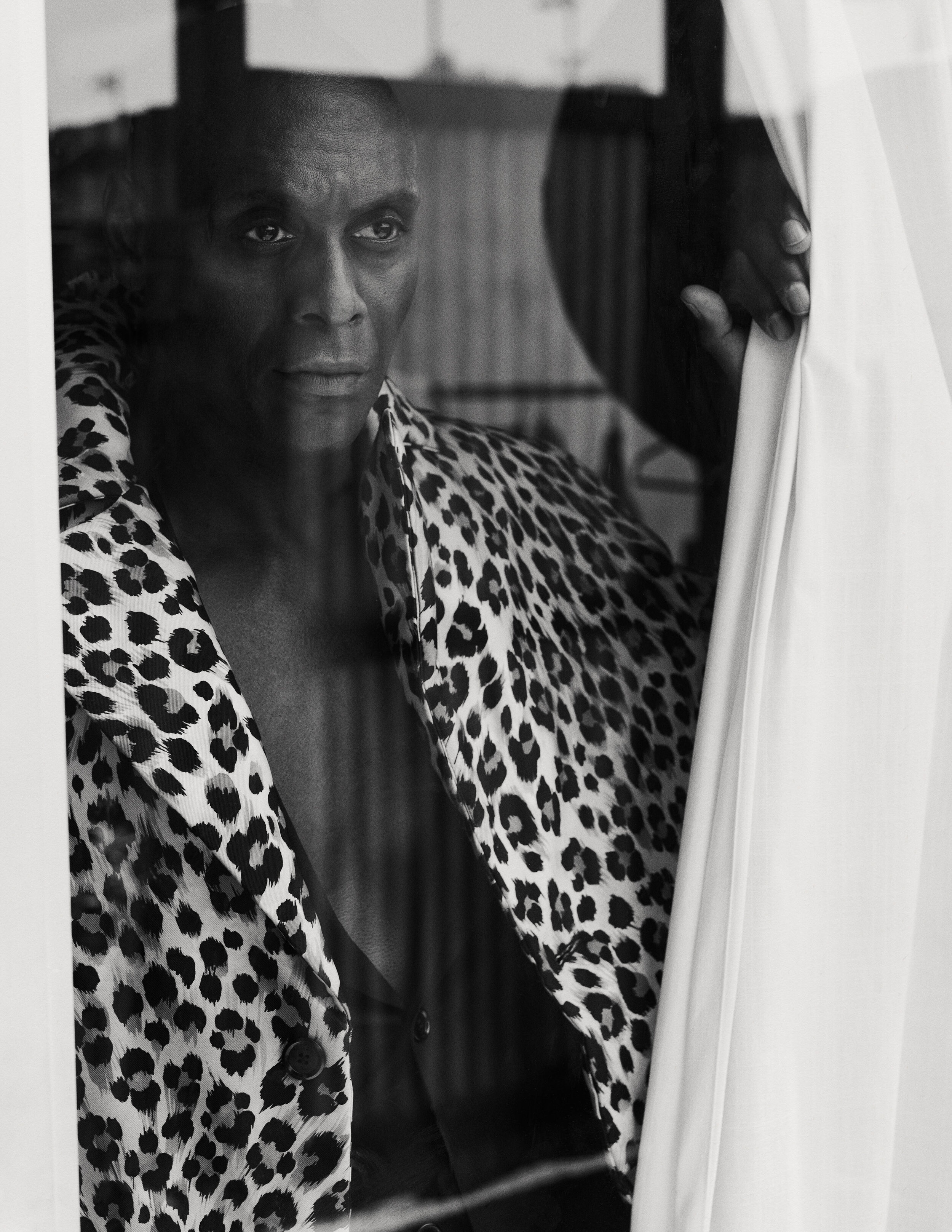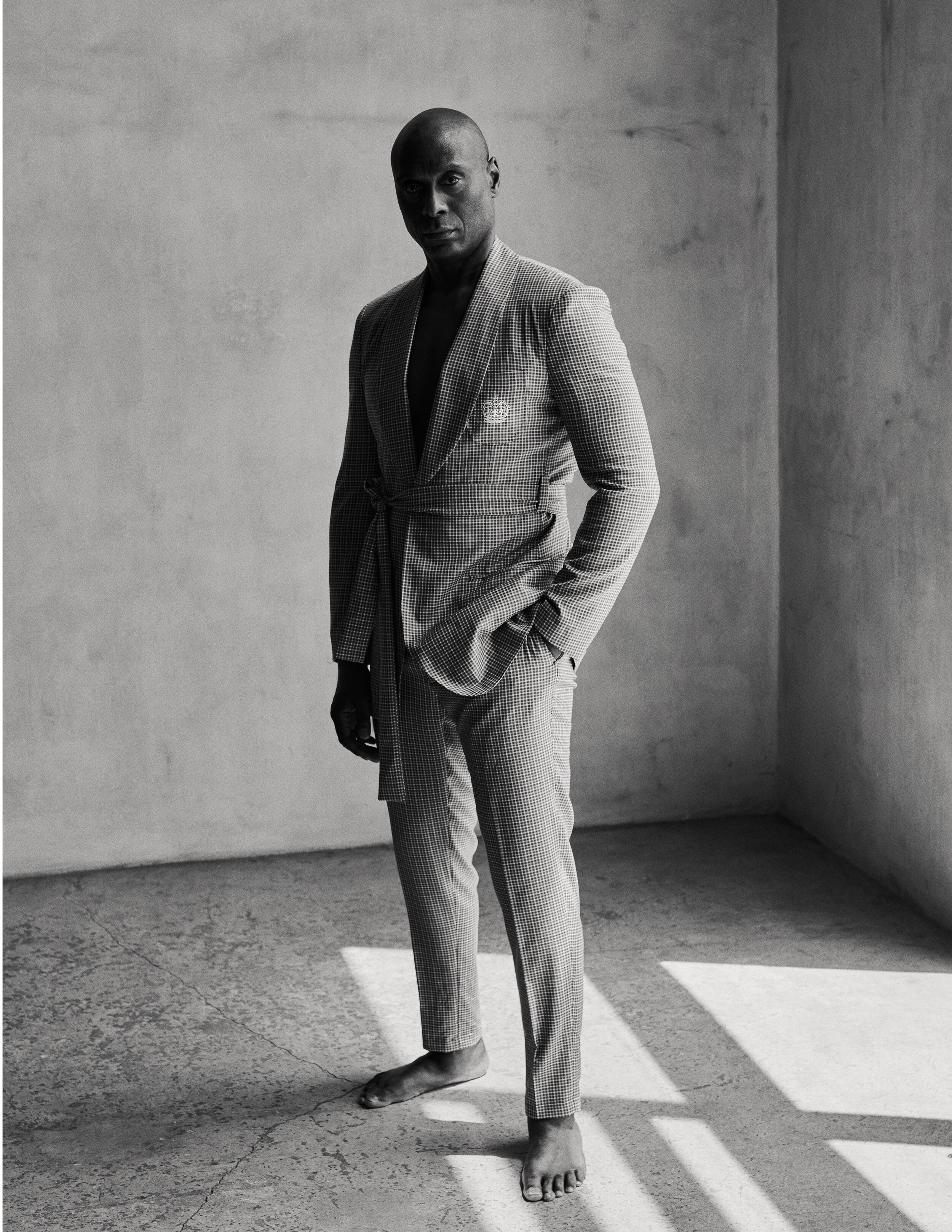ART & CULTURE
STYLING
ORETTA CORBELLI
PHOTOGRAPHY
KEVIN SINCLAIR
Lance Reddick isn’t afraid of taking risks: whether he’s helping his co-star, Keanu Reeves, fending off bad guys in the action thriller franchise John Wick, reprising his role as Charon, or portraying Chief Irvin Irving on Amazon Prime’s longest-running detective crime drama Bosch. Lance Reddick has done it all. To give you some insight, just look into Lance’s background. He fell into acting by chance. He studied physics in college for a year before dropping out to follow his real passion, which is music. He trained as a classical pianist and spent several years as a struggling musician working odd jobs to support his family. But having the experience of being a college dropout, Lance pushed himself and took a leap of faith and applied to Yale theater school; he got accepted and later started doing small theater before moving on to Broadway when acting just took over. His first appearance was in New York Undercover. Since then, he has notably appeared in OZ, The Wire, CSI, and LOST and landed many roles after that. He spent five seasons on Fringe playing Phillip Broyles, a hard-driving head of the FBI agency investigating paranormal activities. And now he is driving into another live-action series on Netflix, Resident Evil set to be released in 2022, as well as hosting the History Channel series “America’s Book of Secrets.” Although his character roles might come across as intimidating, Lance is an actor who’s so relatable and funny that he seems like a best friend.
“BEGINNING MY PURSUIT OF ACTING PROFESSIONALLY, APPLYING TO YALE, AND BEGINNING TO DATE MY WIFE. IT SEEMED AS THOUGH SOMETHING BEYOND MY EGO OR EVEN PRACTICAL REASONABLENESS WAS GUIDING ME IN ALL THREE CASES.”
Read interview below by Kevin Sinclair
Total look HILTON, shoes TOM FORD.
Jacket HILTON.
Kevin Sinclair __ I rarely do interviews with the subjects I work with, but I have been a fan of your work for a long time. I’m so happy that I had the opportunity to photograph you for this piece. I got to know your work on HBO’s OZ when it was first released in 1997, and I have admired everything you have done along the way. Tell me a bit about yourself and how you got into acting?
Lance Reddick __ Acting probably started in high school. Growing up, I was addicted to television and loved Star Trek. One weekend afternoon, I was rooting around my dad’s bookshelf and found an old volume of Shakespeare from his college days. I had read somewhere that William Shatner had been a trained Shakespearean actor and, having opened the book up, randomly found the play, Julius Caesar. I didn’t know anything about the play except the Mark Antony speech, which has become a cliche - “Friends, Romans, countrymen….” I don’t remember how, but I stumbled onto the Brutus passage where he addresses the people after Caesar’s murder right before Mark Anthony comes in and turns the crowd into a mob against Brutus. Anyway, I started reciting it and memorizing it, imagining how Captain Kirk would do it. “Romans, countrymen, and lovers. Hear me for my cause, and be silent that you may hear.” At any rate, that was the beginning of my fascination with the language of Shakespeare. I fell in love with the music of it. Growing up, I had no interest at all in acting as a profession. I dreamed of being a classical composer and trained as a musician from the age of six. At any rate, fast forward, my first year in college, I decided to try acting as an extracurricular and started doing plays in college. It’s the only thing in my life I ever did just for fun. Well, three years into my conservatory training (I went to the Eastman School of Music for my undergraduate), I came to the stark realization that I didn’t want to be a classical composer. I wanted to be a rock star and had been in denial most of my life because of the elitist cultural bias I grew up around. I dropped out of school, promptly got married, and set out to pursue my dream with absolutely no plan. Two years later, my daughter was born, and pretty soon, I found myself working three jobs, seven days a week. One year into this, I had a severe back injury that left me laid up and seriously re-evaluating my life. In a desperate attempt to think outside the box, I thought I’d give acting a try as another angle to jump-start my music career. I quickly realized that regardless of how well trained a musician I was, musical theatre was for real singers, which I was not. Then I decided to start going on straight acting auditions in the local theatre scene in Boston and quickly started getting cast in plays. I also started doing extra work in films and movies and took an on-camera acting class. Then almost two years into it, a chance conversation led me to think about applying to the drama school at Yale. On a lark, I applied and then was shocked when I got in. So at 29, with a wife and a three-year-old in tow, I moved to New Haven, Connecticut, to start my first year at the Yale School of Drama. And it changed my life.
Kevin __ Most of the character roles you play are authority figures and take no bullshit. I was happy to discover that you are so funny. Do you find that in playing such powerful characters, people sometimes have a skewed impression of you?
Lance __ Yes. I feel, especially with television, people think you are the personality you portray on the screen because they see so much of you as that person. And also, because so many American acting stars aren’t doing much more than a version of themselves, it can be a bit jarring to people when you’re nothing like the character. When my wife and I started dating, my wife’s sister asked her if she was sure about me because I seemed intimidating. After all, she was a fan of “Fringe” and assumed I was like Special Agent Broyles. Another time, in the first season of “Fringe,” we were shooting a scene on the street, and one of the cops helping with security turned to my makeup person and said, “that guy's a badass!” (A lot of cops love "The Wire"). She looked around and said, “who?” When he pointed at me, she exclaimed, “Lance?!”
Kevin __ The John Wick series is just mind-blowing. Did you imagine it would become such a multimedia franchise?
Lance __ Not at all. Until that point, I never had much of a film career and struggled to get considered for any significant film roles. The bulk of my career had been in television. Although I loved the script and was excited about the part, I figured it was going to be this little action movie that if we were lucky, would be a cult hit. Then it turned into a juggernaut.
Kevin __ Your character, Charon, is fascinating in John Wick and the action scenes are brutal with bullets flying. How do you prepare to portray the vengeful character?
Lance __ The character work is the same for everything. Know the story, know my lines, find how the character moves and talks, and develop or intuit enough back story to make sure you understand how and why Charon reacts to situations the way he does, what drives him, what does he want. Other than that, stay in shape and, at least with John Wick 3, be diligent about my gun training and stunt rehearsals.
Kevin __ You star alongside Keanu Reeves. Do you care to share any highlights, either serious or funny, of working with him on this production?
Lance __ In the first film, my first scene was the first scene I shot, and it was Keanu’s entrance into the Continental. I remember him walking into the lobby and stopped halfway, and just looked at me. It was only for a moment, but it felt like he was looking through me into my soul. It was chilling. He wasn’t Keanu at the moment. He was John Wick.
Kevin __ You are undoubtedly very talented and have had many recurring roles in the John Wick saga and other TV series. Have you developed friendships with your cast members?
Lance __ I have become quite fond of Ian McShane, and I call him from time to time to say hi, and Mark Dacascos is becoming an excellent friend. From The Wire, John Doman, Lawrence Gilliard, Jamie Hector, and Andre Royo, and Frankie Faison have become some of my closest friends. And the cast of Corporate, perhaps more than anything I have ever done, feels like family to me. I respect, admire, and adore every single one of them. From Bosch, Titus Welliver, Amy Aquino, Jamie Hector (yes, Jamie gets a mention twice), and Troy Evans are my peeps. And from Fringe, I adore Anna Torv and John Noble, and Jasika Nicole has become one of my dearest friends.
Total look KENNETH COLE.
Kevin __ Another excellent action film you recently starred in was Angel Has Fallen. Your character is the head of a secret service. Do you find that you get to cast a lot for these types of intense character roles?
Lance __ Well, intense can be a broad term because Papa Legba, and Christian DeVille, and Lt. Daniels are all intense but completely different.
Kevin __ Let’s get into The Wire. I feel this is the best show and remains exciting to this day. Did you think it was going to be so impactful on so many viewers?
Suit and T-shirt ICEBERG, coat LOUIS VUITTON.
T-shirt DIOR.
Lance __ Yes, but not in the way that I expected. I thought it would be one of those shows that got awards up the ass and celebrated in the industry and pop culture because it was so good and would make half of us movie stars. The reality is that it was ignored by the industry until the last season, was almost canceled twice, and was largely ignored during every award season. Through word of mouth, it has become a worldwide phenomenon that has set the bar for high authenticity and quality. Both critics and the general public widely regard this show as the most significant dramatic series in television history; it is taught in college courses and became a powerful voice in the dialogue about the inherent political corruption and hypocrisy of the war on drugs.
Kevin __ As a person of color, I was deeply disappointed that such a widespread critically praised show made up of a diverse ensemble cast of both black veteran and novice actors was not getting that award recognition that it deserved. Why do you think The Emmys always overlooked The Wire?
Lance __ It was too black in all the wrong ways that make white Hollywood feel safe. A friend of mine once said to me about white Hollywood and white people in general in our culture, “their greatest fear is seeing us as human.” If you want to win awards in Hollywood, generally, it needs to be that right token role in a white show, or the show needs to somehow be about race, or it needs to be a comedy, but not ask white people to look in the mirror too closely. In The Wire, the commanding officer was black; the police commissioner was black, the mayor was black. Half the detectives were black; criminals were not two-dimensional stereotypes, but often absolutely. That, if born to other circumstances, brilliant and ruthlessly disciplined individuals with vision could have quickly succeeded in nonblack market professions. Rather than actually taking the time to watch the show, it was easier for white executives in hindsight to use excuses like, “well, HBO didn’t promote the show. People didn’t know where to find it.” A prominent film and television producer said that to me. We were the lead into The Sopranos, by the way.
Kevin __ You mentioned that you are a bit of a nerd on set, and I read somewhere you felt like an outsider as a kid growing up. I can also relate. When I left Guyana at eight years old to move to America, my peers would make fun of my heavy Guyanese accent. I also had a few school bullies that would terrorize me because I was the perfect target. I had to grow up fast and, in some ways, missed out on a good childhood. Can you tell me some of your experiences as a child growing up?
Total look PHILIPP PLEIN.Opposite: Total look KENNETH COLE.
Lance __ I got picked on mercilessly from about eight years old until I was eleven, mainly by this one guy in school. But at one point, I had skipped a grade, and the kids in that class, in general, made fun of me for all my weird quirks and being so sensitive. I was always musical and started writing songs when I was seven years old. I had a crush on this older girl once - she was eight, and I was seven. I wrote her a song. I sang it to her thinking it would make her fall in love with me like on TV. She paused for a moment, then burst out laughing. Then she ran and told the rest of the class what I had done. That was my first experience. They all got a lot of mileage out of that one for a while. He who laughs last, I suppose.
Kevin __ You recently posted on Instagram a picture of you with a few dogs and a great T-shirt that reads, “Be kind to animals, or I’ll kill you.” Are you an animal lover, and were those your babies?
Lance __ Well, those are my wife’s babies. I’m just along for the ride. [Laugh] The shirt is a joke from John Wick.
Kevin __ Despite your demanding life schedule, you manage a healthy relationship with Instagram. How has social media impacted your life and ‘voice?’
Lance __ Well, we might have different definitions of “healthy” regarding Instagram, but I have to say I’m not much of a picture person. I’m more of a word person, so I’m more active on Twitter. But in terms of it impacting my likes, I’d say it was really during the pandemic that I was on Instagram a lot. It was an opportunity to share different sides of myself artistically - both comedically and musically - and politically. It’s also been quite an education in the best and the worst of what people are capable of (including myself) and just an education in human nature in general.
Kevin __ On Bosch, one of Amazon’s longest-running Prime originals, you play Irvin Irving, a chief of police. How did this project come about?
Lance __ It was an offer. Eric Overmeyer, our show-runner, is not only an acclaimed playwright but was a writer and producer on the fourth season of The Wire. He sent me a personal note asking me to play the role. After doing The Wire and Fringe back to back, I didn’t want to do another top cop role, but it was initially only supposed to be a recurring role. So I figured, why not while I worked on developing a comedy for myself - which never worked out, by the way. But then again, I was eventually able to do Corporate and Bosch at the same time.
Kevin __ Now that Bosch has reached its conclusion, what else is in store for you in 2022?
Jacket KENNETH COLE, coat MOSCHINO.
Robe DAMARI.
Lance __ John Wick 4, which comes out next year, I’ll also be playing the male lead in the new live-action Netflix series "Resident Evil." And I’ll also be playing one of the leads in a new animated comedy. I cannot say what it is yet, as the network has not announced the official cast.
Kevin __ What inspires you? Can you describe some moments of destiny where you felt an unexplainable magnetic pull towards a subject or work?
Lance __ Beginning my pursuit of acting professionally, applying to Yale, and beginning to date my wife. It seemed as though something beyond my ego or even practical reasonableness was guiding me in all three cases.
Kevin __ Do you have any advice for young aspiring actors of color pursuing a career in Hollywood?
Lance __ Well, there are three parts to that question - 1) pursuing a career as an actor, 2) doing it as a person of color, 3) doing it in Hollywood. If being a star is the most important thing to you, then I have no advice. I’m only marginally good at that skill set at best. If being an actor, which means caring about the craft of acting and living a life in the pursuit of excellence in that craft is what’s most important to you, then fame is merely a tool to help you get what you want. To do the kind of work that is consistently fulfilling takes power because power gives you choices. Learn, practice, create and collaborate, then repeat, over and over again. And this is where comedians and sketch comedy people may have a bit of a leg up because they are constantly building their skills, developing material, and building relationships. At the same time, actors are mostly waiting for the phone to ring, and the phone rings less often and for lower quality opportunities if you are of color. That’s just the reality. Lastly, be yourself. This town is crazy about fitting people into molds, and the gatekeepers consistently have poor taste, and because of that, are looking at numbers to tell them who and what to choose. “You need to be thinner. You need to dye your hair. You need to look younger. You need your nose done.” Ad nauseam! For example, I once had a meeting with a prominent manager while I was on The Wire, where she told me that there was no work because I was a forty-year-old black man. What she really meant was that it would take more work than she was willing to put in because of my age and race. The following year, in addition to shooting the last season of The Wire, I shot two movies and was cast in LOST and Fringe. You just have to believe in yourself and know you have a purpose.
Photography Kevin Sinclair, Styling Oretta Corbelli, Grooming Barbara Lamelza, Talent Lance Reddick (Portrait PR)

